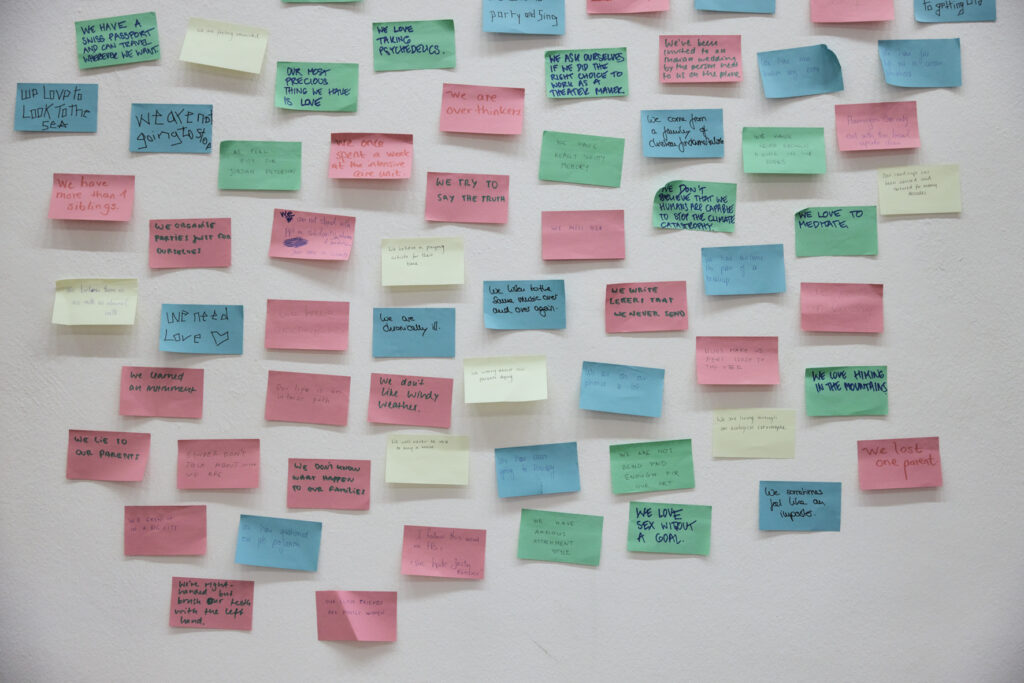–
We hear a loud, shrill, angry, one-minute scream. Jana Shostak’s jugular veins tighten like those of a wrestler, a shot-putter. Power, frustration, anger, and sadness form the timbre of this vocal eruption. An announced volcanic eruption, with a request for participation. Some accept the invitation and join her, laughing nervously, gazing around the garden in amusement, then stumbling effortlessly and without transition, back into their interrupted conversations. We hear Austrian, Belgian, Brazilian, Bulgarian, Colombian, Filipino, German, Hungarian, Iranian, Irish, Lebanese, Lithuanian, Nepalese, Nigerian, Polish, Rwandan, Slovenian, Swiss, Turkish and Ukrainian voices asking why they have been invited here – what their place can be at this festival, what their participation means. We hear „we don’t want to be consumed as artists in exile„, we hear „can we even do a performance as Ukrainian artists when it’s not about the war?“, we hear „who are we looking at?“, we hear „to be appropriated is to be recognised“, we hear „where is the moral judgement?“, we hear „how to erase your culture„. We hear questions – burning questions. But do we even listen? Who are „we“, anyway, who gather here and dodge questions, try to answer them, ignore them. Print them as a label on the programme, and yet hold the internationally-oriented panel discussion in English only after repeated requests from the audience. „We“, who wait silently in the armchairs, while a loud ticking timer punctuates the torture posture taken by Igor Shugaleev, which holds as an act of solidarity with the Belarusian political prisoners.
The fact that the framing discourse programme of this year’s Theatertreffen presents itself under the question – seeming provocatively self-reflexive – „who has the privilege to not know?“, makes one think a little of cis men discussing feminism. In a certain sense is Theatertreffen an old white man, that’s not necessarily/really a secret here. To make such a sudden change of heart publicly effective on the occasion of its 60th birthday is, of course, a surprise for family & friends. Some people might even worry: are these political aspirations the aftermath of a yoga-retreat, grandpa? Where have you been lately?
But no, this results not from an innocent flourishing Ayahuasca-awareness – the Theatertreffen obviously wants to work on its image. And it certainly should do so, if it still wants to be relevant. The question of who is actually being played for here seemed secondary for a long time, when a certain closed society was still adulating itself with blithe ignorance. However, it is by no means enough to ask oneself rhetorical questions: Carolin Hochleichter, Joanna Nuckowska, Olena Apchel, as well as Matthias Pees are addressable as four contact persons for the paradigm and contour shift of the festival and house. They are increasingly tired of the same old demands – that (and how) the age-old mill of the institution should finally be fought – but nevertheless confidently point to the future. And rightly so: addressing the questions raised and elaborated above is no easy task. Nor is it an easy task to position oneself in the discourse against the German-speaking theatre lobby. The fact that these four nevertheless dare to try, create space for exchange, take these questions seriously, and promote an increased visibility of marginalised positions is already noteworthy with regard to a historical contextualisation of this event. At the same time, the aforementioned are not even the first to strive for structural change within the institution. Just remember for example Yvonne Büdenhölzer’s introduction of the women’s quota. Only in 2019, which was relatively very late (which is not to deny anything of the significance of this act, rather to underline it), the reactions at the time were unfortunately still rather semi-reactionary. The arrival of the institution to the present is progressing remarkably slowly. Even as one should celebrate „Ophelia’s Got Talent“ for its empowerment, it does not reflect a comprehensive representation in its actual scope: flaunting cis femininity, yes, but still exclusionary when it comes to FLINTA*’s diversity.
The claim cannot be to have direct answers to these important questions. That would not do justice to the urgency, complexity, and vastness of the origin of these questions. Instead, to actually listen, to constitute the discourse on the basis of this – perhaps not to hold oneself up as an answering authority and entity, but rather to take a step back from the speaking position, and give space to the voices that have been „unheard“ for far too long, to let their words stand for themselves, to acknowledge them: This is the task to be accomplished, and not only by the trio.
